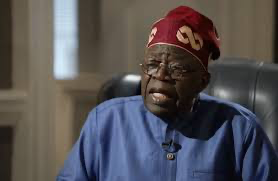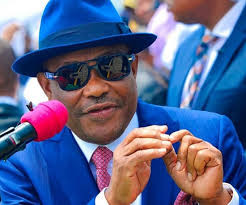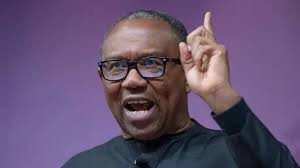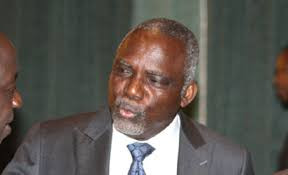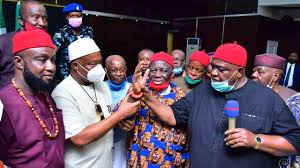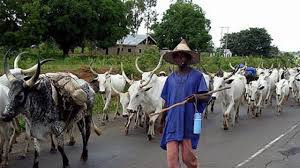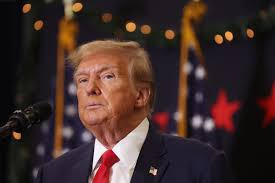NBC News
TOKYO — Former Japanese leader Shinzo Abe was fighting for his life on Friday after being shot at a campaign event.
The attack in the western city of Nara left Abe in critical condition, Prime Minister Fumio Kishida said, and shocked a country where gun violence is virtually nonexistent and laws on ownership are strict.
Abe, Japan’s longest-serving prime minister, had just begun a speech near a train station when gunfire was heard around 11:30 a.m. local time (10:30 p.m. Thursday ET). Public broadcaster NHK, citing the local fire department, reported that Abe was in a state of cardio and pulmonary arrest, suggesting that his heart had stopped.
It said he had been admitted to Nara Medical University Hospital. Officials said that one person had been apprehended in relation to the shooting.
Nobuo Kishi, the Japanese defense minister and Abe’s younger brother, said doctors were “making every effort to provide life-saving treatment, including blood transfusions.”
He called the shooting an “attack on democracy.”
Speaking from his office in Tokyo, a visibly shaken Kishida said that while the attack was still being investigated, “it was a despicable and barbaric act that took place in the midst of an election, which is the foundation of democracy.”
“I condemn it in the harshest possible terms,” he told a hastily arranged news conference after returning from campaigning in the country’s north.
Kishida said no decisions had been made as to how the shooting would affect elections for the upper house of the Japanese Parliament, which are scheduled for Sunday. Abe, 67, who stepped down in 2020, was campaigning for other members of the governing conservative Liberal Democratic Party, LDP, but is not a candidate himself.
Abe dominated Japanese politics for the best part of a decade and has remained politically active since his resignation, leading the biggest faction in his party.
The incident sent shockwaves through Japan, where gun violence is extremely rare. Handguns are banned in the country and people must undergo extensive tests, training and background checks to obtain and keep shotguns and air rifles.
Iwao Horii, an LDP member of the upper house representing Nara, was standing next to Abe when the former prime minister was shot. “We heard two loud sounds while he was talking and he fell immediately after that,” Horii said at a news conference. He added that Abe was unresponsive when emergency medics tried to resuscitate him.
“This is something that shakes the very foundations of democracy and cannot be forgiven,” he said. “At this point we are all praying for the quick recovery of former Prime Minister Abe.”
The shooting was also condemned by the country’s main opposition party, the center-left Constitutional Democrats. “This is an unforgivable act of barbarism, but the first and utmost priority is the condition of former Prime Minister Abe, and I just pray that he survives,” party leader Kenta Izumi told reporters.
The attack in Nara, western Japan, was stunning for one of the world's safest countries.AP
The U.S. ambassador to Japan, Rahm Emanuel, said that he was shocked and saddened by news of the shooting.
“Abe-san has been an outstanding leader of Japan and unwavering ally of the United States,” Emanuel said in a statement Friday. “The U.S. Government and American people are praying for the well-being of Abe-san, his family, and people of Japan.”
The White House also expressed shock at Abe’s shooting.
“We are closely monitoring the reports and keeping our thoughts with his family and the people of Japan,” a spokesperson said.
Abe hails from Japan’s political elite and as prime minister had made reviving economic growth through his “Abenomics” policies a key pillar of his time in office.
Abe’s resignation two years ago came amid a worsening of his ulcerative colitis, a chronic bowel condition he’d battled for years.
He announced his resignation days after he set a record as Japan’s longest-lasting prime minister, having been in office for almost eight years. He previously served as prime minister from 2006 to 2007.
Though Abe had been praised for amplifying Japan’s profile on the world stage, his party was plagued by scandals and he was accused of mishandling the country’s response to the Covid-19 pandemic.
Abe was the first foreign leader to meet with Donald Trump after he became U.S. president-elect in November 2016.
In a post to his Truth Social platform late Thursday, the former president called Abe “a truly great man and leader.”
“He was a true friend of mine and, much more importantly, America,” Trump said. “This is a tremendous blow to the wonderful people of Japan, who loved and admired him so much. We are all praying for Shinzo and his beautiful family!”

